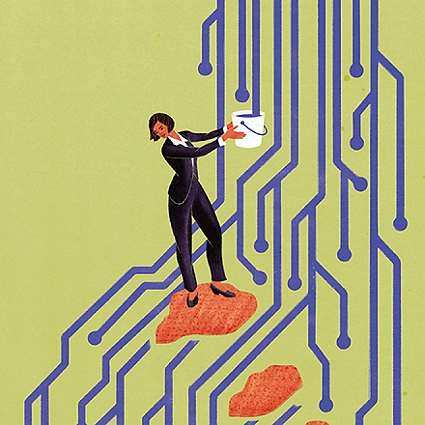Addressing the ethics of social work in the context of technology is an ongoing process. While technology offers continual benefits, the associated risks must be carefully assessed to ensure responsible, informed decision-making in clients’ lives.
Zone 1: Truth, Disinformation, and Propaganda
Center for Humane Technology strongly addresses this zone by discussing how algorithms promote incorrect information, often confusing users and undermining their understanding of what is true. This is particularly relevant to social workers because clients may be influenced by these technologies and disregard recommendations that are grounded in research and professional training.
Reamer’s article, Artificial Intelligence in Social Work: Emerging Ethical Issues, emphasizes transparency in AI tools. Maintaining honesty and trust in these tools is essential to establishing confidence between social workers and their clients.
Zone 3: Economic and Asset Inequalities
Funk and Fitch, Harnessing Technology for Social Justice, addresses the inequities in technology access among underserved communities. Social workers are impacted because populations with limited resources may not be able to access certain services, which exacerbates disparities.
Meng Jiang et al., A Generic Review of Integrating AI in Cognitive Behavioral Therapy, discusses how AI can increase accessibility to therapy based on resource availability. This directly relates to who can afford and access these technologies, highlighting barriers that social workers must navigate to reach certain clients.
Zone 5: Surveillance State
“Why and How the Power of Big Tech is Increasing in the Policy Process” highlights how governments rely on Big Tech infrastructure to shape policies, raising surveillance concerns for all users of these platforms.
“Social Work Boundary Issues in the Digital Age” examines how virtual calls within clients’ and practitioners’ homes can create risks of surveillance. These practices raise concerns for both client privacy and social worker confidentiality, as sensitive information could potentially be exposed.
Zone 7: Implicit Trust and User Understanding
“Adapting Clinical Skills to Telehealth: Applications of Affirmative CBT with LGBTQ+ Youth” is a strong example of this zone. Youth were trained on telehealth platforms, with safe environments and protocols implemented to support understanding of the technology.
Digital Transformation in Social Work: Integrating Technology for Enhanced Practice, Outreach, and Education emphasizes digital literacy and informed consent, establishing trust between social workers and the communities they serve. This is vital for supporting user proficiency, engagement, and confidence in digital interventions.

Hello, your post does a great job highlighting how complex, and necessary, it is for social workers to navigate technological ethics with intention rather than assumption. Your discussion of zone 1 was especially strong, particularly the point about how misinformation can directly interfere with the therapeutic relationship when clients begin trusting algorithms over trained professionals. Also, the surveillance concerns you raised are timely too, virtual practice brings convenience, but it also blurs boundaries and introduces risks that were previously unimaginable in traditional settings.
I also discussed zones 1, 3, and 7. I think risk Zone 1 is probably the scariest one for me personally when I see people I know or members of my own family being manipulated by misinformation. Being exposed to the CHT has helped me have more hope around educating people about the truth, but I am still unsure what to expect from the future of big tech. I also think Reamer’s work in general is particularly interesting because it doesn’t seem there are many other articles like his thus far. His deep dive in to the world of AI and social work is really helpful to people like us who are just learning to navigate that world ourselves.
Great blog post! I believe technology can be such a game-changer in social work, but it definitely comes with some challenges. Misinformation and unequal access can make it hard for clients to get the help they need, so being transparent is super important. Privacy is also a big deal, especially with virtual sessions where sensitive info could slip. Overall, it really shows that social workers have to find a balance between using tech and keeping clients safe and supported.
Hello, I really liked how clearly you connected each risk zone to the readings. Your points about misinformation and its impact on clients felt especially relevant. I’ve definitely seen how confusing online content can be for people trying to understand their own mental health. I also appreciated your focus on equity and access; the way you tied AI and therapy availability to real-world barriers was really thoughtful. Your section on surveillance and digital trust also stood out to me, especially the reminder that even telehealth settings can create privacy risks.
Kiara,
You followed the instructions for this post and did a good job highlighting the readings that related to the zones. I hope you actually read the actricle on the Power of. Big Tech, because I can’t really tell that you did by what you wrote here. We didn’t discuss it much in any of the assignments and I think it’s an important issue, particularly right now. You selected the correct materials for each zone, I would have liked to hear more about why you thought that material exemplified the concerns of that zone.
Dr P